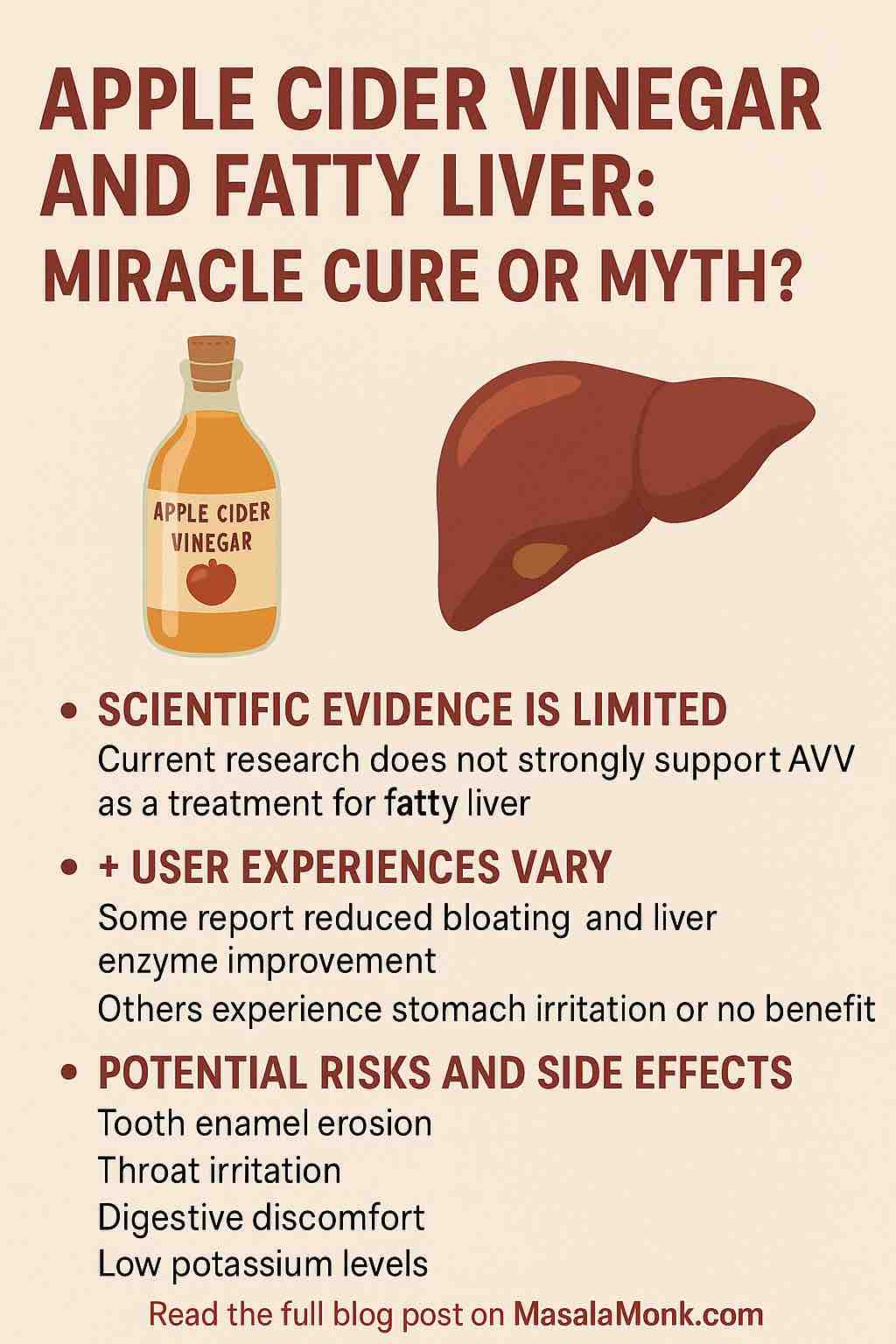
If you’re searching for apple cider vinegar for arthritis, you’re not alone. ACV shows up everywhere—from kitchen hacks to wellness reels—promising less stiffness, calmer joints, and a natural alternative to medicine. However, before you swap treatments for a pantry bottle, it’s worth seeing what major arthritis organizations, dentists, dermatologists, and patient communities actually say. In this guide, we’ll separate the myths from the facts, cover topical use (including scalp and skin), examine real user experiences, and outline safer ways to use ACV without derailing the strategies that truly help joints.
Key takeaway: ACV can live in your kitchen as a flavor booster, but it does not replace arthritis care. Major charities classify cider vinegar as a food myth for joint pain—there’s no strong clinical evidence it reduces RA, OA, or psoriatic arthritis symptoms. See the Arthritis Foundation’s “Arthritis Food Myths” and the Versus Arthritis nutrition booklet for details.
⚠️ Informational Education Disclaimer: This article is for general education only and isn’t medical advice. It doesn’t diagnose, treat, or replace professional care. Always consult your healthcare provider about your specific symptoms, medications, or treatment options.
Does apple cider vinegar for arthritis help—or is it just hype?
Let’s start with the big question. Despite the buzz, the Arthritis Foundation lists cider vinegar among popular remedies whose anti-inflammatory benefits aren’t supported by robust human trials. Likewise, Versus Arthritis states there’s no evidence that ACV improves arthritis symptoms, although using a small amount in food is fine if you enjoy the taste. In other words, the internet often oversells what ACV can do for joints.
So why do some people swear it works? Often, when people add ACV, they simultaneously make whole-diet upgrades—more salads, more home cooking, fewer ultra-processed meals. Consequently, they may sleep a bit better, move a bit more, and hydrate more often. The result can be modest relief, but that’s a lifestyle effect, not proof that apple cider vinegar for arthritis is an effective treatment on its own.
If you want to channel that momentum into something proven, build meals around an anti-inflammatory-leaning pattern using this practical anti-inflammatory diet guide, and stock your kitchen with staples from this anti-inflammatory foods list. Moreover, trimming back predictable triggers helps too—see the 5 worst foods for arthritis and this longer list of foods to avoid.
Apple cider vinegar for arthritis in RA: what to know
Is ACV good for rheumatoid arthritis (RA)?
In short, no clinical trials show ACV reduces RA pain, swelling, or inflammatory activity. Rheumatology experts interviewed by CreakyJoints are clear: ACV isn’t an evidence-based RA therapy. Therefore, if you have RA, your best outcomes still come from DMARDs or biologics, a structured movement plan, and consistent medical follow-up.
Can ACV still have a place in an RA routine?
Yes—as a flavor tool, not a treatment. If a splash of ACV makes beans, grains, and veggies more craveable, that may help you stick to a nourishing pattern. Nevertheless, it should never replace RA medications or delay escalation when your rheumatology team advises it.
For realistic add-ons beyond ACV, skim these natural anti-inflammatory options and pick one or two to test alongside your doctor’s plan.
Apple cider vinegar for arthritis in OA & knee pain
For knee osteoarthritis, social media loves ACV wraps, soaks, and compresses. However, there are no credible clinical trials showing these methods relieve OA knee pain. Meanwhile, what does help most people with OA is remarkably consistent: strength and mobility work, regular physical activity, and weight management when relevant. That’s the backbone of NHS osteoarthritis treatment guidance and their advice on living well with OA. In practice, a smart exercise plan plus a realistic nutrition approach typically outperforms any single “superfood” claim.
Even so, if you like ACV in your meals, keep it. Just remember that apple cider vinegar for arthritis is best seen as a kitchen helper, not a knee treatment.
Also Read: Apple Cider Vinegar for Hair, Dandruff, and Scalp.
Is ACV anti-inflammatory? What the science really says
You’ll find lab and animal studies suggesting anti-inflammatory mechanisms for fruit vinegars. For example, narrative reviews on fruit vinegars and inflammation and on vinegars’ potential in inflammatory conditions discuss pathways like antioxidant activity and metabolic effects. Nevertheless, mechanism ≠ clinical proof. We still lack convincing human trials showing that ACV meaningfully reduces arthritis pain or swelling in day-to-day life. Put simply, test-tube promise hasn’t translated into reliable relief for joint disease.
- Mechanistic overview: Fruit vinegars and inflammation (review)
- Broader vinegar review: Vinegars and inflammatory conditions
Topical use: where ACV can and cannot fit
Topical ACV advice online ranges from sensible to risky. Consequently, it’s crucial to separate joint claims from skin care claims.
Apple cider vinegar on joints (hands, knees, etc.)
For joints, topical ACV has no proven benefit. More importantly, there are documented chemical burns from vinegar-based DIY treatments, especially when used undiluted, under occlusion (covered), or on sensitive skin. Dermatology case reports describe injuries after “natural” protocols involving ACV or vinegar-aspirin mixtures. Therefore, skip topical ACV on joints—there’s real risk and no payoff.
- Representative cases: burn injuries following vinegar/ACV home protocols have been described in dermatology literature (case reports and clinical letters).
ACV for scalp psoriasis itch (not joints)
This is a different scenario. Some dermatology resources mention diluted ACV as a comfort measure for scalp itch—not as a treatment for psoriatic arthritis or joint inflammation. If you try it, keep the solution well-diluted, avoid broken or cracked skin, and rinse after it dries. For a consumer-level overview, see WebMD on ACV and psoriasis itch. Even here, proceed cautiously and discontinue at the first sign of irritation. For skin-focused alternatives, you might also read about turmeric for psoriasis, then discuss options with a dermatologist.
Teeth, mouth, and esophagus: acidity matters
Because ACV is acidic, frequent exposure can erode tooth enamel. The American Dental Association’s dental erosion guidance recommends limiting acid exposure, sipping acidic drinks through a straw, and rinsing with water afterward. Moreover, the ADA’s note about the viral “balsamic soda” trend shows how even sugar-free acidic drinks can harm enamel over time.
⚠️ Informational Education Disclaimer: This article is for general education only and isn’t medical advice. It doesn’t diagnose, treat, or replace professional care. Always consult your healthcare provider about your specific symptoms, medications, or treatment options.
Weight, blood sugar, and the ACV hype cycle
Some people take apple cider vinegar for arthritis believing it helps with weight loss or blood sugar, which might indirectly ease joint load. However, ACV’s weight-loss story is shakier than headlines suggest. A widely cited vinegar weight-loss trial that fueled years of excitement was retracted in 2025, and editors urged caution about overhyping ACV as a fat-loss shortcut. Therefore, if weight management is part of your OA plan, focus on sustainable calorie balance, adequate protein and fiber, and steady activity rather than relying on ACV alone.
- Media coverage of the retraction: see recent reporting (e.g., ABC Health) summarizing the journal’s decision and the reasons for withdrawal.
Read our posts on Apple Cider Vinegar and Belly Fat: Does It Really Work? as well as Apple Cider Vinegar for Diabetes and Blood Sugar Management.
Real-world experiences: what people actually report
Anecdotes aren’t data, but they do reveal patterns:
- Some people say a small, diluted dose with meals or a tangy ACV dressing makes them feel a little looser. Perhaps it’s the vinegar; perhaps it’s the shift toward more plants, fewer ultra-processed foods, and better hydration.
- Others notice no difference or experience heartburn and tooth sensitivity, especially with undiluted shots.
- People with scalp psoriasis sometimes report itch relief from diluted ACV rinses (again, a skin effect, not joint relief).
Balanced articles from patient communities like CreakyJoints reflect this mix and caution readers not to replace proven care with pantry experiments. Consequently, treat anecdotes as ideas to test gently, not prescriptions.
Safe ways to try Apple Cider Vinegar for Arthritis
I’m not here to police your pantry; I’m here to keep you safe and practical.
If drinking ACV:
- Always dilute. Start with 1 teaspoon in a large glass of water with meals (not on an empty stomach).
- Protect your teeth. Use a straw and rinse with water afterward; wait at least 30 minutes before brushing (per ADA guidance).
- Watch your gut. If you notice reflux, nausea, or throat irritation, stop.
- Medication cautions. If you’re on diuretics or have potassium/electrolyte issues, check with your clinician first.
If using on skin/scalp:
- Joints: Don’t do it. There’s no benefit and a non-trivial burn risk in the literature.
- Scalp psoriasis itch: If you experiment, use a diluted rinse only on intact skin, and rinse off after it dries. Discontinue at the first sting or redness.
In the kitchen (best option):
- Everyday dressing: 1–2 tsp ACV whisked with olive oil, mustard, and herbs. Toss with lentils, chickpeas, greens, and whole grains.
- Marinade base: ACV + olive oil + garlic + spices. It’s versatile, affordable, and works with the anti-inflammatory foods list.
- Warm drink alternative: If you want something cozy without the acid exposure, try a cup of turmeric-ginger tea.
What actually helps arthritis—reliably
No single food will fix arthritis. Nevertheless, patterns do:
- Move more, build strength. For OA, consistent activity and progressive strengthening improve function and reduce pain. This is central to NHS osteoarthritis treatment and living well with OA. If pain limits you now, begin with chair yoga for restricted mobility, then ease into this beginner chair sequence.
- Weight management where relevant. Even modest, sustained weight loss reduces load on knees and hips; multiple clinical guidelines recommend it for lower-limb OA.
- Diet quality over “miracle foods.” A balanced, anti-inflammatory-leaning pattern—more fiber, plants, lean proteins, and healthy fats—beats chasing one ingredient. See the Versus Arthritis nutrition booklet for practical guidance. Build meals from the anti-inflammatory foods list and the practical how-to guide.
- Targeted food questions? If you’re exploring fruit claims, our deep dive on cherries and arthritis explains where evidence is stronger (especially for gout). For recurrent flares triggered by diet, review the 5 worst foods for arthritis and broader avoid list.
- Stick with proven medical care. For RA and other inflammatory types, DMARDs/biologics, physio, and a team approach matter far more than pantry fixes.
Importantly, apple cider vinegar for arthritis can still “fit” as a tangy flavor that helps you enjoy veg-forward meals—just keep it in its lane.
⚠️ Informational Education Disclaimer: This article is for general education only and isn’t medical advice. It doesn’t diagnose, treat, or replace professional care. Always consult your healthcare provider about your specific symptoms, medications, or treatment options.
Realistic 4-week personal test for Apple Cider Vinegar for Arthritis
If you love ACV and want to run a careful N=1 experiment, try this:
- Keep your core plan unchanged for 4 weeks (meds, exercise, sleep, hydration).
- Add ACV only as a diluted drink with meals or in dressings—no shots, no topical joint wraps.
- Track a simple pain/function score (0–10), plus any side effects (reflux, tooth sensitivity, skin irritation).
- Stop if you notice irritation, or if there’s no meaningful benefit by week 4.
- Share your notes with your clinician to decide what (if anything) is worth continuing.
This protects your enamel, respects your stomach, and—most importantly—keeps attention on the interventions that actually move the needle.
When to contact your clinician
- Worsening joint swelling, morning stiffness, or loss of function
- New reflux, enamel sensitivity, or mouth irritation after starting ACV
- Any sign of a chemical burn from topical use
- You’re on medications that affect potassium or fluid balance (check first)
Bottom line
Using apple cider vinegar for arthritis is popular, but the evidence is thin. Keep ACV in the kitchen, not the medicine cabinet: use it to make healthy meals tastier, follow enamel-friendly habits if you drink it, and avoid topical joint wraps that risk burns. Meanwhile, put most of your energy into what actually helps—movement, strength, sleep, weight management when appropriate, and proven medical care. ACV can play a supporting role in a delicious, joint-friendly diet, but it isn’t the hero of your arthritis plan.
⚠️ Informational Education Disclaimer: This article is for general education only and isn’t medical advice. It doesn’t diagnose, treat, or replace professional care. Always consult your healthcare provider about your specific symptoms, medications, or treatment options.
FAQs
1) Is apple cider vinegar good for arthritis?
In short, not really. There’s no strong clinical proof that apple cider vinegar for arthritis reduces pain or swelling. However, if you enjoy it in food, that’s fine—just manage expectations and focus on habits that consistently help joints.
2) Does apple cider vinegar help rheumatoid arthritis (RA)?
No. RA needs proven, clinician-guided care; ACV isn’t a substitute. Nevertheless, it can live in your diet as a tart flavor that helps you enjoy veggie-forward meals.
3) Can apple cider vinegar help osteoarthritis (OA) or knee pain?
Evidence is lacking. Moreover, topical “knee wraps” or compresses with ACV haven’t been shown to work. Therefore, prioritize strength, mobility, and weight management where appropriate.
4) How do I take apple cider vinegar for arthritis—if I still want to try it?
If you insist on trying, use small amounts diluted in water or, better yet, in dressings with meals. Additionally, sip with a straw and rinse your mouth afterward to be kinder to your teeth.
5) What’s a sensible amount or “dosage” to test?
Start low—think teaspoon-level amounts diluted in a large glass of water with food. Then, track how you feel for 2–4 weeks. If irritation shows up, stop.
6) When is the best time to take ACV—morning or night?
Timing matters less than dilution and taking it with meals. Morning or evening is fine; however, avoid taking it right before brushing your teeth or on an empty stomach if you’re sensitive.
7) Can apple cider vinegar cause joint pain?
Unlikely directly. Nevertheless, ACV can trigger heartburn, throat irritation, or tooth sensitivity in some people—especially when taken undiluted—so proceed gently and pay attention to your body.
8) Is apple cider vinegar anti-inflammatory?
You’ll see claims about anti-inflammatory effects, but arthritis-specific relief hasn’t been demonstrated. Consequently, treat ACV as a kitchen flavor, not as an anti-inflammatory therapy.
9) Is topical apple cider vinegar good for knee pain or sore joints?
No. Besides lacking evidence, undiluted or covered applications can irritate or burn the skin. Instead, consider proven pain-management strategies and speak with a clinician for persistent pain.
10) Can I use apple cider vinegar for scalp psoriasis itch?
Sometimes a well-diluted rinse may feel soothing for scalp itch. However, avoid broken skin, rinse after, and discontinue if it stings. Importantly, this targets skin comfort—not psoriatic arthritis in the joints.
11) Is apple cider vinegar with honey good for arthritis?
It’s a popular combo, but benefits for arthritis remain unproven. Even so, if it helps you enjoy more whole foods and stay hydrated, that broader routine may feel better overall.
12) Are ACV gummies, tablets, or pills better than liquid?
Not necessarily. Formulations vary, and the active acidity that affects teeth is part of the point. Consequently, focus on overall diet quality rather than expecting ACV pills to fix joint pain.
13) Does “with the mother” make a difference for arthritis?
“Mother” refers to fermentation byproducts; it changes texture and taste more than outcomes for arthritis. In other words, apple cider vinegar for arthritis isn’t more effective just because it has “the mother.”
14) Can too much ACV be harmful?
Yes, potentially. Overuse can aggravate reflux, upset the stomach, or erode tooth enamel. Therefore, keep amounts small, dilute well, and stop if you notice irritation.
15) Will apple cider vinegar reduce inflammation enough to replace my meds?
No. Even if you like ACV in salads, it should never replace prescribed treatments. Moreover, the biggest wins still come from consistent movement, sleep, stress care, and clinician-guided therapies.
16) What’s the best way to include ACV without side effects?
Prefer culinary use: whisk into dressings, marinades, or sauces. Additionally, if you drink it, always dilute, take it with meals, use a straw, and rinse with water afterward.
17) Could ACV help indirectly through weight or blood sugar?
Possibly, but only as part of broader habits—more home-cooked, fiber-rich meals and steady activity. Therefore, see ACV as a supporting flavor inside a healthy routine, not the main driver.
18) What should I track if I run a 4-week ACV experiment?
Track a simple pain/stiffness score (0–10), daily activity, sleep, and any side effects. Meanwhile, keep your usual care unchanged. If nothing improves—or if irritation appears—stop and refocus on proven strategies.
19) Does apple cider vinegar help psoriatic arthritis?
No evidence supports ACV for psoriatic arthritis. Nonetheless, some people find diluted topical use soothing for scalp itch (skin-only), but that’s separate from joint inflammation.
20) What’s the bottom line on apple cider vinegar for arthritis?
Use apple cider vinegar for arthritis as a tangy kitchen addition, not as a treatment. Furthermore, combine it with habits that reliably help—movement, strength, sleep, stress basics, and clinician-guided care.


















